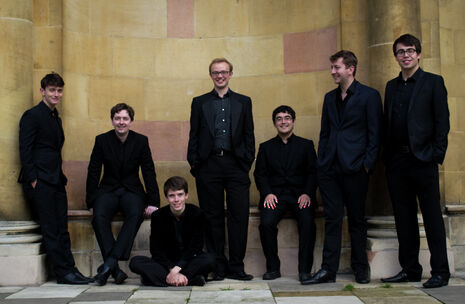Concert: The Gesualdo Six
The vocal sextet gave a balanced and professional performance at King’s College Chapel

Cambridge is a city well known for its choral music. Visit evensong at any one of its many colleges and you will no doubt find music performed to an extremely high calibre. To stand out as a vocal ensemble from the well-rehearsed, famous choirs that dominate the sacred music scene is no mean feat, but the niche that The Gesualdo Six have carved for themselves is one that adds to the rich culture of church music in the city.
As their name would suggest, The Gesualdo Six are a vocal sextet that specialise in the performance of Renaissance polyphony, under the direction of Owain Park, an Organ Scholar at Trinity College. The ensemble itself is comprised of a mix of undergraduates and recent graduates of several different colleges, representing at present King’s, St John’s and Trinity. The choice of repertoire for the concert (which was the closing performance of the Music at King’s micro-festival), was Gesualdo’s Tenebrae Responsories for Maundy Thursday (Feria Quinta). Perhaps not initially the most accessible of programmes for the uninitiated, the six voices of Patrick Dunachie and Guy James (counter-tenor), Joseph Wicks and Hiroshi Amako (tenor) and Michael Craddock and Jonathan Pacey (bass) blended beautifully in the stunning setting of King’s College Chapel to create a truly outstanding concert.
What was immediately clear from the first plainsong, sung hauntingly by Michael Craddock, was the effortless poise of the group; here is a choir that brings the same stillness to their demeanour as to their most quiet, gentle passages, and the professionalism shown by all six singers both during and between responses was impressive for what is on paper, though not in sound, effectively an amateur ensemble.
Each vocal part showed control and dexterity that blended with the next, but in particular Hiroshi Amako’s plaintive ‘Mellius illi erat’ during the sixth Responsary was deeply moving. Despite the very occasional moments of tuning difficulties, the balance between the parts was exquisite. At times you felt like there were a hundred voices; at others, only one.
The communication between each vocal part added to the wonderful sense of line throughout the work. One questioned occasionally the necessity of a conductor in a group of such sensitive singers; at times, some of the natural musicality between the singers was lost and felt a little forced. But what Owain Park and the singers have managed to achieve is an ensemble with extraordinary potential, who stand head and shoulders above any other vocal group in Cambridge, and who surely have a promising future ahead.
 News / News in Brief: Postgrad accom, prestigious prizes, and public support for policies11 January 2026
News / News in Brief: Postgrad accom, prestigious prizes, and public support for policies11 January 2026 Comment / Will the town and gown divide ever truly be resolved?12 January 2026
Comment / Will the town and gown divide ever truly be resolved?12 January 2026 Comment / Plastic pubs: the problem with Cambridge alehouses 5 January 2026
Comment / Plastic pubs: the problem with Cambridge alehouses 5 January 2026 Lifestyle / The only party girl in the East Midlands12 January 2026
Lifestyle / The only party girl in the East Midlands12 January 2026 News / 20 vet organisations sign letter backing Cam vet course13 January 2026
News / 20 vet organisations sign letter backing Cam vet course13 January 2026








